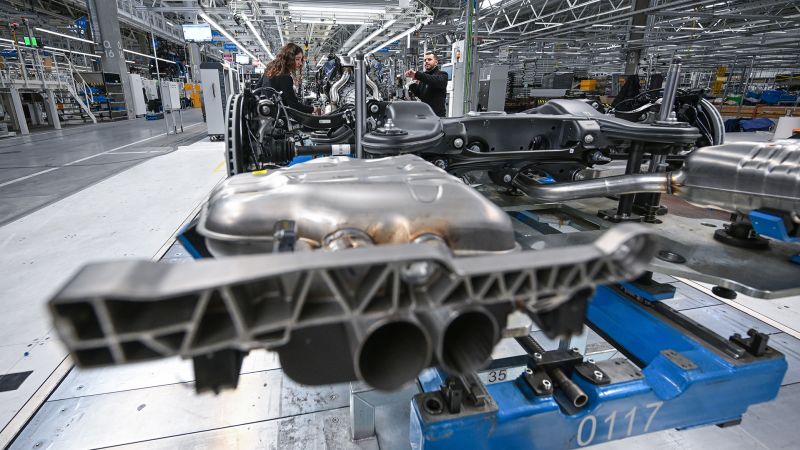

CNN
—
When EU lawmakers voted to ban the sale of new combustion engine cars in the bloc by 2035, it was a landmark victory for climate. In February, the European Parliament approved the law. All that was needed was a rubber stamp from the bloc’s political leaders.
Then Germany changed its mind.
In a reversal that stunned many EU insiders, the German government decided to push for a loophole that would allow the sale of combustion engine cars beyond the 2035 deadline — as long as they run on synthetic fuels.
It’s an exception that could put the European Union’s green credentials at risk. The bloc is legally obliged to become carbon-neutral by 2050. With cars and vans responsible for around 15% of its total greenhouse gas emissions, a phase-out of polluting vehicles is a key part of EU climate policy.
Here’s what’s at stake.
The ban on internal combustion engine cars is one of the centerpieces of the European Union’s ambitious plan to cut its emissions to net zero by 2050 — which means removing from the air at least as much planet-heating pollution as the bloc emits.
The law envisions a total ban on the sale of new diesel and gasoline cars by 2035. The European Union argues that the deadline is necessary because the average car’s lifespan is around 15 years — so to get a fleet that produces no carbon pollution by 2050, sales of combustion engine cars must end by 2035.
Germany is now pushing against the idea that all internal combustion engines must be banned. Instead, it says engines powered by “green” fuels should be allowed.
Other European countries, including Italy, Poland and the Czech Republic, have joined Germany in demanding the exception.
The law was meant to be formally approved by the European Council — the European Union’s top political body — earlier this month, but the vote was postponed because of the growing opposition.
Synthetic fuels, or e-fuels, are made using hydrogen and carbon dioxide captured from the atmosphere.
Their proponents often portray them as “clean”, but the reality is not straightforward. Burning these man-made fuels releases similar amounts of planet-heating emissions and air pollutants as using conventional fossil fuels.
The “green” credentials refer to the manufacturing process: e-fuels are made from carbon that was removed from the atmosphere, which offsets the emissions they produce.
For climate campaigners and the lawmakers who negotiated the new rules, this is not good enough.
“The text is very clear,” Dutch EU lawmaker Jan Huitema told CNN. “We only allow cars on the market as long as there are zero emissions from driving them. E-fuels emit carbon dioxide from the tailpipe. They will not be allowed.”
There are other problems too. For one, e-fuels are not yet produced at scale. The manufacturing process is expensive and requires a lot of renewable energy.
Supply of e-fuels is likely to be limited for some time, and critics say they should be reserved for industries that do not have a viable alternative to fossil fuels, such as aviation and shipping.
Many EU policy makers were flabbergasted by the demands from Germany and others. The legislation had been in the works for more than two years and had required many rounds of negotiations.
“I was the lead negotiator with the [European] Council on the final text, it was adopted there by the ambassadors of the different member states,” Huitema said. “You have an agreement and now, all of a sudden, a couple of member states want to refrain from the agreement. That is not how you negotiate and how you make deals with each other.”
Climate groups say the changes would water down action on climate change.
Transport & Environment, a clean transport campaign group, said the loophole for e-fuels would slow down the transition to electric vehicles.
“[Germany’s] plan would derail the decarbonization of the new fleet while allowing more conventional oil to be used in the existing fleet post-2035 — a win-win for Big Oil.”
Even some carmakers have come out against the potential changes to the law.
A group of dozens of companies including Volvo and Ford have penned an open letter to the European Union, pushing against the exception.
“First-mover companies have already significantly invested in zero-emission vehicles and should be rewarded for taking the inherent risks to decarbonize their fleet. It would be a very negative signal to reverse the political agreement reached last year,” they said.
Germany is governed by a coalition, and it is one of the parties, the liberal FDP, that is calling for the changes.
“The internal combustion engine is not the problem. The fossil fuels that run it are,” German transport minister Volker Wissing, of the FDP, said on Twitter earlier this month. “The goal is climate neutrality, which is also an opportunity for new technologies. We need to be open to different solutions,” he added.
Germany is home to some of the world’s largest automakers, including BMW, Mercedes-Benz, Audi and Volkswagen, and the government has to walk a tightrope between ambitious climate policies and the interests of a powerful industry that keeps the economy humming.
Manufacturers of car components and engines, fossil fuel producers and fuel transportation companies have been lobbying for the exception because it would allow them to continue using their existing infrastructure and products.
The Federation of German Industries, a lobby group, said e-fuels could make “a major contribution to achieving the adopted climate targets.”
“Since they can be used immediately without having to build a new infrastructure, they can also be implemented in economically less developed countries,” according to a statement on the group’s website.
The dispute over the legislation is causing friction within Germany’s government.
Environment Minister Steffi Lemke of the Greens, another coalition party, has criticized the challenge to the law.
“Germany should remain a reliable partner to its EU partners. The new CO2 fleet regulation for passenger cars and light commercial vehicles, which Germany has supported in recent months, is a major step forward for European climate protection,” she said in a statement earlier in March.
If passed, the law would be one of the world’s strongest measures to phase out gasoline vehicles.
Scientists say reducing planet-heating pollution is non-negotiable if the world is to limit global warming to 1.5 degrees Celsius (2.7 degrees Fahrenheit) above pre-industrial levels and avoid a key tipping point beyond which extreme flooding, droughts and wildfires will likely become much more frequent.
Despite such warnings and the pledges made in the Paris Agreement to tackle climate change, global emissions have continued to rise, barring a dip in 2020.
Talks are continuing to persuade Germany to support the law. In its current draft form, the law would allow cars running on e-fuels to be sold after 2035, but only if they were fitted with technology preventing them from running on gasoline or diesel.
Whether Germany will accept the proposal remains unclear.
Some are concerned that the dispute casts doubt on the European Union’s ability to implement its ambitious climate agenda.
“This debate is really destabilizing,” said Elisa Giannelli, a senior policy advisor at E3G, a climate think-tank, noting that the European Union had been “on track for climate neutrality.”
“Backtracking on a piece of legislation is potentially really undermining the credibility of what we’ve achieved over the past years,” she said.
“It’s not just about cars. It’s about the political signals that that [dispute] sends.”
